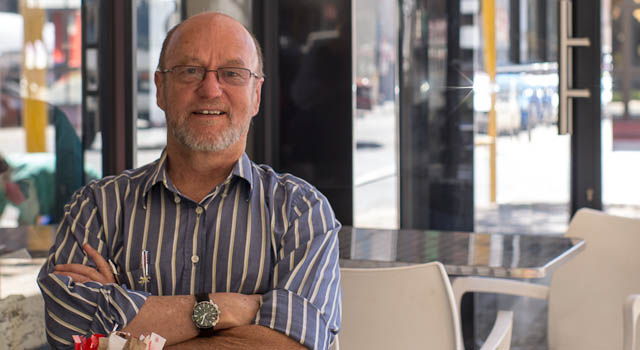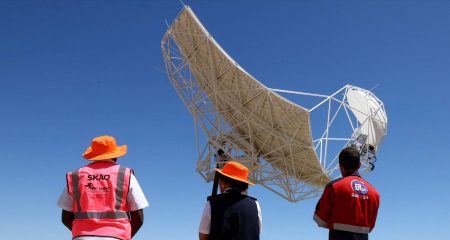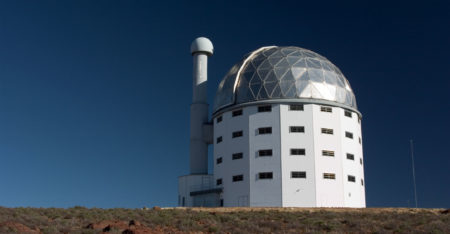
Derek Hanekom has taken over the department of science & technology after eight years as its deputy. The Mail & Guardian sat down with him for a cappuccino.
Where does your interest in science come from?
I found my school years easy, but I wasn’t a model pupil, for sure, and never did my homework. I gravitated towards the humanities and started with law, but dropped out and decided to travel instead.
When I came back I started farming with my wife and we learnt everything from doing research and reading… It’s built into my being interested in things. My move to minister of agriculture & land affairs was a natural one and it was then that I started reading about scientific discovery for pleasure. Bill Bryson’s A Short History of Nearly Everything was a critical book. I loved it and, lo and behold, I was appointed to science & technology.
I’m not a scientist, but I need to know about the various disciplines and the only way you learn is by reading.
Why fund science and technology?
The best answers and solutions to some of the everyday problems people face come through science. Take, for instance, HIV, where we have learnt how it works and we are working on a vaccine.
We don’t get immediate results. We won’t build a house, but we can give advice on how to build a better house. We offer advice through the research we do. The best way is to demonstrate.
Do other departments listen?
The big problem is this all-or-nothing debate. On average, people are going to be waiting years for a house and this approach means people are going to be dissatisfied.
But we can improve the quality of life, for far more people far faster, by doing innovative things in informal settlements. Temporary solutions can improve lives. The human settlements department is listening to this and adjusting policies to make more sustainable houses.
The challenges are multiple in the field of water. Apart from infrastructure management, the big challenge is getting to that last eight or 10% of people. We’re piloting something in the Eastern Cape, where it is difficult to get water to people. The thing is to make sure that, at least, when people collect water it’s clean. They can collect water from rainwater tanks and those tanks are clean.
At the Human Sciences Research Council fabulous work was done to understand the whys — why are people hungry? Is the education system working? These social scientists give us information that allows for policy to be adjusted. It’s up to me to understand this work and advocate it to the relevant makers of policy. As a minister I’m in a better position to persuade people to go into rural areas and do some of the basics and give innovative solutions to these households.
How big do you want the department to get?
What we need is a bigger budget. Public spending will have to increase to meet our research and development targets — not that I’m lobbying through the media; we don’t do that! But we will need to increase public funding and encourage greater private-sector investment, with mechanisms such as the tax incentive. This won’t go towards a bigger department — we are a small department — but for more centres of excellence at universities.
We want to do research that will help to resolve our society’s challenges. So we help other ministers … which you can see in the recent discovery of two antibodies that can fight the HI virus. We funded the research, but the minister of health was the most prominent at the announcement.
What initiatives belong solely to the department?
We have very few areas that are exclusively our own domain, such as astronomy and the Square Kilometre Array (SKA) radio telescope. On palaeontology there are other departments that are legislated to look after it — cultural and environmental affairs — but it’s accepted as being ours. Elsewhere, we are merely creating a framework that will produce more and better technology to find solutions to our problems.
How viable is the SKA, given the economic woes in donor countries?
I don’t think phase one of the SKA will be a big challenge. It’s the 3 000 dishes that will be a challenge. We certainly are not going to be funding that. We will be expected to put in a premium and make sure the infrastructure is there, but the bulk of the funding will come from overseas. It is exactly like it has happened with other telescopes, except that this is on a scale the world has never seen. We have to get the world excited. People are already lining up years in advance to use the MeerKAT radio telescope. Once you get the world’s scientists excited, the money tends to follow.
How do you make science sexy?
I go out as much as I can and encourage the expansion of existing programmes, such as the Eskom Expo for Young Scientists, and smaller initiatives that reward pupils for their initiative and innovative thinking.
There’s a lot more happening than when we were at school. I think we have a different kind of education. People are more confident and are doing more creative things at schools all over the country. Something like an SKA excites people, so you follow it up with a major human capital funding programme. Mark Shuttleworth excited young people, and that’s the sort of thing we need.
What is your role in the education system?
To some extent we are at the mercy of our education and we try to help there. But we are not going to be running 27 000 schools.
We have a pilot programme in collaboration with the department of basic education, which uses technology to enhance rural schooling. It’s using a range of ideas, such as cheap tablet devices. Ultimately, the department wants to move away from textbooks and into the 21st century. It’s doable, but it’s not easily doable. We can move in that direction and we can assist them. We’re trying a lot of things to improve the quality of teaching in rural schools and we are studying their effect.
If we want the maths and science students to be well prepared for university, we have to intervene. Most intervention won’t come from us but some will, such as students getting bursaries through the national research foundation. Our role at school level is very limited. All we can do is guide them on how they can do things better to enhance learning.
We don’t have a clash with higher education and we do a lot of work with them. I have to have good relationships with my peers.
What do you want your legacy to be?
To develop a good base for the fundamentals so we get good scientific work in our country. And seizing things that come along, such as the SKA. We would not have got it if [former minister Naledi] Pandor had, in that last period, not been a powerful champion of it. I would like to see a whole science community that is acknowledged and supported and will do excellent work to make a difference. This will make our economy more competitive and find solutions to socioeconomic problems. By the end of my term in 18 months, I’d like the MeerKAT to really be under construction and we should be very confident that, through bringing in partners, the SKA is not in jeopardy.
Is this your last job?
I don’t think I’d go back to farming and I have never really been in the private sector. I think it would have to be some kind of public-sector work. I’d have to decide for myself whether I’d want to go back to parliament, and in that event I may or may not be appointed to something. If I don’t go back, all I would be is in semi-retirement. I wouldn’t be doing nothing. — (c) 2012 Mail & Guardian
- Visit the Mail & Guardian Online, the smart news source
- This Q&A has been shortened from the original
- See also: Derek Hanekom, iMinister




